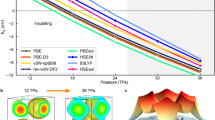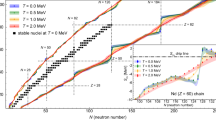Abstract
Every self-bound Fermi liquid will exhibit a liquid–gas phase equilibrium at low temperatures, because the pressure is positive at low densities due to the kinetic energy of degeneracy, and falls to zero again at the equilibrium density. Nuclear matter is seldom found under conditions of two-phase equilibrium, however: in usual nuclear reactions, a heated (‘compound’) nucleus is produced out of equilibrium with its surroundings, which are at a much lower temperature. The most familiar example of a two-phase equilibrium occurs in the crust of neutron stars inside the neutron-drip line1, at temperatures of less than an MeV. In supernovas, in the crucial moments when the implosion is reversed to an explosion, densities comparable to those of neutron stars may be attained with associated temperatures of 5 to 10 MeV. An accurate knowledge of the properties of nuclear matter under these conditions is essential to the understanding of supernova dynamics2. This communication shows how laboratory observations with the latest generation of nuclear accelerators can be used to infer the surface tension of the liquid–gas interface in nuclear matter–an essential ingredient of the equation of state for which a reliable theoretical model is not available.
This is a preview of subscription content, access via your institution
Access options
Subscribe to this journal
Receive 51 print issues and online access
$199.00 per year
only $3.90 per issue
Buy this article
- Purchase on Springer Link
- Instant access to full article PDF
Prices may be subject to local taxes which are calculated during checkout
Similar content being viewed by others
References
Baym, G. & Pethick, C. A. Rev. nuclear Sci. 25, 27–77 (1975).
Brown, G. E., Bethe, H. A. & Baym, G. Nuclear Phys. A375, 481–532 (1982).
Fermi, E. Notes on Thermodynamics and Statistics, 135–136 (University of Chicago Press, 1966).
Fisher, M. E. Physics 3, 255–283 (1967).
Bethe, H. A. Rev. mod. Phys. 9, 690 (1937).
Stocker, W. & Burzlaff, J. Nuclear Phys. A202, 265–273 (1973).
Curtin, M. W., Toki, H. & Scott, D. K. Phys. Lett. 123B, 289–292 (1983).
Finn, J. E. et al. Phys. Rev. Lett. 49, 1321–1324 (1982).
das Gupta, S. & Mekjian, A. Z. Phys. Rep. 72C, 131–183 (1981).
Lamb, D. Q., Lattimer, J. M., Pethick, C. & Ravenhall, D. G. Nuclear Phys. A360, 459–482 (1981).
Friedman, B. & Pandharipande, V. R. Nuclear Phys. A361, 502–520 (1981).
Siemens, P. J. & Rasmussen, J. O. Phys. Rev. Lett. 42, 880–882 (1979).
Siemens, P. J. & Kapusta, J. I. Phys. Rev. Lett. 43, 1486–1489 (1979).
Bertsch, G. & Siemens, P. J. Phys. Lett. B126, 9 (1983).
Schulz, H., Munchow, L., Ropke, G. & Schmidt, M. Phys. Lett. 119B, 12–16 (1982).
Bertsch, G. & Cugnon, J. Phys. Rev. C24, 2514–2520 (1981).
Author information
Authors and Affiliations
Rights and permissions
About this article
Cite this article
Siemens, P. Liquid–gas phase transition in nuclear matter. Nature 305, 410–412 (1983). https://doi.org/10.1038/305410a0
Received:
Accepted:
Issue Date:
DOI: https://doi.org/10.1038/305410a0
This article is cited by
-
Navier–Stokes–Fourier system with phase transitions
Meccanica (2023)
-
Tasting nuclear pasta made with classical molecular dynamics simulations
Frontiers of Physics (2021)
-
Properties of nuclear pastas
Frontiers of Physics (2021)
-
Global Regularity of Solutions for a One-dimensional Nuclear Fluid with Non-monotone Pressure
Acta Mathematicae Applicatae Sinica, English Series (2019)
Comments
By submitting a comment you agree to abide by our Terms and Community Guidelines. If you find something abusive or that does not comply with our terms or guidelines please flag it as inappropriate.



